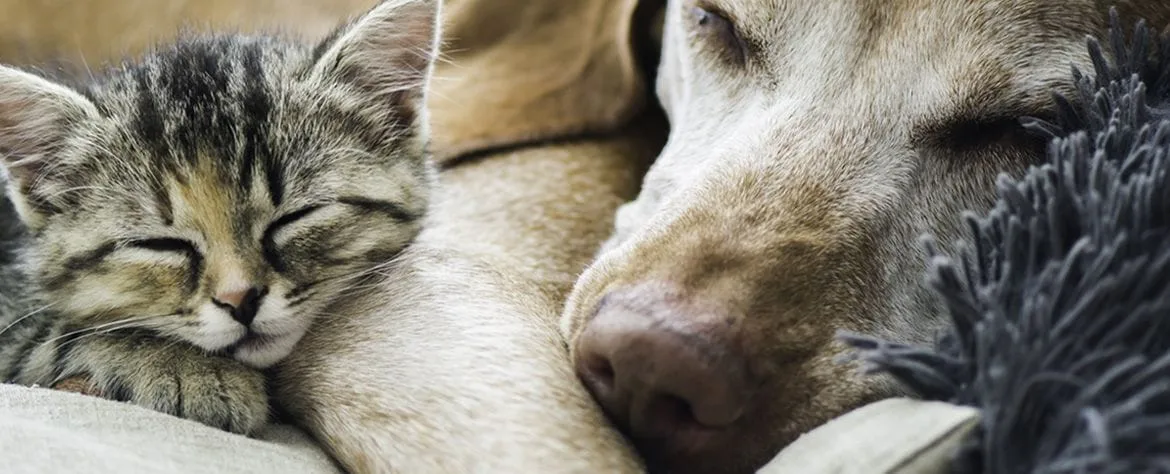Adopting a cat or kitten? Here's what you can do to help your cat adjust to its new home.
Read more

When you hear the phrase domesticated animals, you probably automatically think of cats or dogs. But, what about fennec foxes, prairie dogs, pigs, sugar gliders, and even skunks? Although it’s not very common, each of these animals can also be domesticated. More and more people are opting out of getting a traditional pet and deciding to add a more unusual addition to their family.
Before you decide to become an owner of one of these animals, it’s important that you take into consideration the special care it will need compared to other, more typical pets. You will also need to review your state’s laws and regulations to make sure that it is legal to own one of these animals. Select one of the articles below to find out more about the options you have for domesticated animals as well as what they eat, what type of habitat they need, and more.
-
How to Help Your New Cat Feel Welcomed in Your Home
Category: Newsletter Library, Cats
-
Box Turtles
Category: Choosing Your Pet, Exotics, Reptiles, Turtles, Choosing Your Pet, Exotics
North American box turtles are mainly terrestrial turtles, although they do spend some time in shallow water (Asian box turtles tend to be a bit more aquatic). Compared to aquatic turtles such as red eared sliders, they are more challenging and complex pets, and are not the best choice for beginning
Read more -
Fleas
Category: Pet Health, Pests and Parasites, Pet Health
A common parasite, fleas are found in almost every area of the world and can be found on dogs, cats, and many other mammals. They survive year to year even in cold climates because they live on pets, in buildings, and on wild animals. There are four stages to the flea life cycle. Eggs are laid by an
Read more -
Hypothyroidism
Category: Pet Health, Chronic Conditions, Pet Health
Hypothyroidism is the natural deficiency of thyroid hormone and is the most common hormone imbalance of dogs. This deficiency is produced by several different mechanisms. The most common cause (at least 95% of cases) is immune destruction of the thyroid gland. It can also be caused by natural atrophy
Read more -
Most Common Digestive Issues in Dogs and How to Relieve Them
Category: Newsletter Library, Nutrition & Food
-
Glaucoma in Cats
Category: Newsletter Library, Cats
-
Keep Your Pets Safe From Toxic Household Items
Category: Newsletter Library, Pet Dangers
-
Preventing Obesity in Cats
Category: Newsletter Library, Cats
Even one extra pound could affect your pet's health. Find out how you can keep your cat slim and trim.
Read more -
Pet Dental Care - Tips to Manage Your Pet’s Oral Health
Category: Newsletter Library, Keeping Pets Healthy
-
Learn How to Master Walking Your Dog for Walk Your Pet Month
Category: Newsletter Library, Seasonal Topics
-
Bringing a New Pet in the Home in the New Year
Category: Newsletter Library, Seasonal Topics
Are you planning on adding a pet to your family this year? These tips will help you prepare for the arrival of your furry, feathered, or finned friend.
Read more -
Cold Symptoms in Dogs
Category: Newsletter Library, Keeping Pets Healthy
-
Cold Weather Pet Safety
Category: Newsletter Library, Seasonal Topics
-
Keep Your Pet Safe During the Holidays
Category: Newsletter Library, Seasonal Topics
-
November is Pet Cancer Awareness Month
Category: Newsletter Library, Seasonal Topics
-
How to Treat Common Injuries in Your Dog
Category: Newsletter Library, Tips for Pet Owners

Contact Us
We look forward to hearing from you
Location
Find us on the map
Office Hours
Our Regular Schedule
Office Hours
Monday:
8:00 am-5:30 pm
Tuesday:
8:00 am-5:30 pm
Wednesday:
8:00 am-5:30 pm
Thursday:
8:00 am-12:00 pm
Friday:
8:00 am-5:30 pm
Saturday:
8:00 am-12:00 pm
Sunday:
Closed
